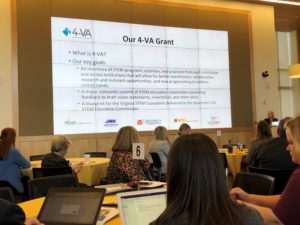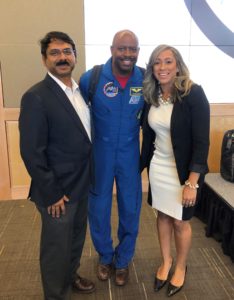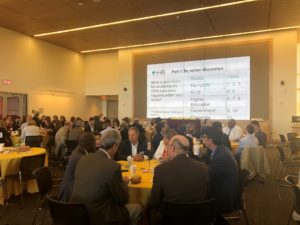 More than 140 leaders from Virginia’s K-12 and higher education institutions, out-of-school providers, the private and business sectors, and state officials and institutions joined together recently to begin the work of developing a blueprint for a statewide STEM network. This structure will be the basis for creating cross sector pedagogies providing Virginia’s youth access to a learning environment which will allow them to grow important skills to engage in science, technology, engineering, and mathematics from PreK – 16. “Virginia’s STEM Summit” was hosted by Virginia Commonwealth University and sponsored through a grant from 4-VA. The project was developed by a group 4-VA schools – VCU, Virginia Tech, George Mason, James Madison, and University of Virginia in coordination with the Virginia Department of Education and the Office of the Governor.
More than 140 leaders from Virginia’s K-12 and higher education institutions, out-of-school providers, the private and business sectors, and state officials and institutions joined together recently to begin the work of developing a blueprint for a statewide STEM network. This structure will be the basis for creating cross sector pedagogies providing Virginia’s youth access to a learning environment which will allow them to grow important skills to engage in science, technology, engineering, and mathematics from PreK – 16. “Virginia’s STEM Summit” was hosted by Virginia Commonwealth University and sponsored through a grant from 4-VA. The project was developed by a group 4-VA schools – VCU, Virginia Tech, George Mason, James Madison, and University of Virginia in coordination with the Virginia Department of Education and the Office of the Governor.
Governor Ralph Northam has charged Virginia’s STEM leaders with the job of creating an infrastructure, with input from all stakeholders, for the newly-appointed Virginia STEM Education Commission. The strategic plan is due next year.
As 4-VA grant team member and Associate Director of the Center for Educational Networks and Impacts at Virginia Tech Susan Magliaro, explained, “Our goal today is to provide a well woven tapestry of information from our STEM leaders.”

The day-long conference began with a keynote address from retired NASA astronaut, materials science engineer, educator, and former NFL wide receiver Leland Melvin. Melvin shared with the audience how STEM education necessitates an open mind, perseverance, and personal support in order to be successful. George Mason University’s PI on the project, Dr. Padmanabhan Seshaiyer noted, “Leland was the perfect kick-off for our conference. He clearly illustrated that STEM doesn’t have to be stuffy or difficult to understand, it’s a hands-on experiential learning opportunity which can open doors for all of our students, and especially our minority or underserved students. It can bring projects and process to life.”
Other Mason participants in this 4-VA summit included members with diverse backgrounds and expertise in STEM including Dr. Rebecca Jones, Ms. Kelly Knight, Dr. Karen Lee, Dr. Kammy Sanghera and Ms. Kerin Hilker-Balkissoon.
The conference also included a panel discussion addressing some of the more difficult obstacles to overcome while implementing STEM programs, presented by a range of leaders from the business, education and policy arenas. Each highlighted best practices developed by state or local school boards from around the country. The consensus was that successful existing ecosystems in STEM were developed by building a culture which welcomed all stakeholders, and where the resulting guidelines represented a convergence of values and practices.
Following the panel discussions, attendees joined together to hammer out the framework for such ecosystems based on their professional backgrounds.
Longtime STEM proponent Amy Sabarre, Director of STEM Education for the Harrisonburg City Schools, observed, “I’ve been involved with the development of a core curriculum for STEM in the Commonwealth for years, and this Summit has been a long time coming. But, we’re here now, and we’re making great strides.”
Concurrently, newer stakeholders see the same bright future. Says Makerspace coordinator at William and Mary, Jonathan Frey, “Makerspaces have been growing and evolving at a dramatic pace throughout the world. What was once a location for tinkerers to play with technology has now become an impactful community engineering center both in academia and the private sector. Here in the Commonwealth there are dozens of makerspaces and it’s time to coordinate collaboration throughout Virginia. The 4-VA STEM Summit offers an opportunity for introduction and collaboration between such efforts from the peaks of Appalachia to the sands of the eastern shore.”
 The day concluded with a group effort to integrate the work created at each roundtable into a viable framework for the Commonwealth. The conclusions will provide the basis for the STEM ecosystem build out and will be forwarded to the Virginia’s STEM Education Commission.
The day concluded with a group effort to integrate the work created at each roundtable into a viable framework for the Commonwealth. The conclusions will provide the basis for the STEM ecosystem build out and will be forwarded to the Virginia’s STEM Education Commission.
